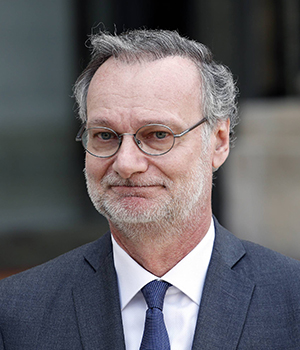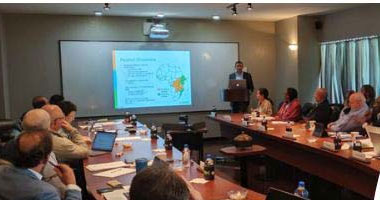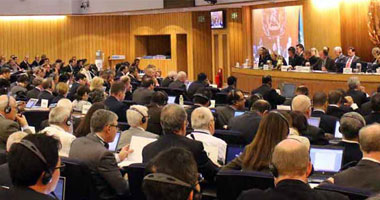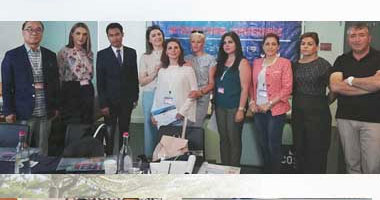Are you ready for the third generation of work?

Pierre Nanterme,
Chairman and CEO, Accenture
There are reasons to be optimistic as we begin 2018. Self-sustaining growth in the global economy and the recovery of international trade have strengthened in the last year.
But certain socio-economic fissures continue to grow wider. Concerns about how intelligent technologies might further strain the social contract between people and business must urgently be addressed.
As stewards of an inclusive and connected world, business leaders should consider how to harness technology to make an important and lasting difference. I am a passionate advocate for developing the future workforce, addressing complex social problems and shaping a regulatory framework. These three subjects all revolve around greater innovation and growth.
Developing the future workforce
Responsible employers who pursue bold growth agendas must embrace intelligent technologies. Not just to automate or to drive efficiencies, but to build new outcomes that ultimately create new streams of growth and employment.
Businesses will have to reconfigure the future workforce entirely. This requires striking the right balance between automation and human skills, and retraining existing workers to create new value. As traditional job descriptions become obsolete, people will need to collaborate in new ways with increasingly intelligent machines.
In fact, Mercedes-Benz has replaced robots in its manufacturing plants with highly skilled workers. People proved to be more efficient and adaptable in satisfying demand for customized cars. Accenture has also seen a significant transformation in its workforce after automating several thousand roles. Following significant investment in reskilling, not a single person lost their job. Many have taken on higher-value roles, some working with intelligent technology.
Improving social outcomes
In the ‘fractured world’ described by the World Economic Forum, technology must be used to improve social outcomes as well as to bring commercial gains. By collaborating with local NGOs and governments, business leaders can achieve both ends at an extraordinary scale.
For example, consider personal identification. More than one billion people - about a sixth of the world’s population - are largely excluded from society because they lack the most basic data: documented proof of their existence and identity. Without it, they are shut out of the formal economy. They are deprived of access to the basics we take for granted, such as benefits, banking, education, healthcare, housing and voting rights.
To address this problem, Microsoft and Accenture are working together to support ID2020, a digital project using blockchain and biometric technologies to allow individuals to access and share their data electronically. This kind of innovation will make it easier to employ, to be employed, and to improve people’s broader welfare. It will support wider economic growth.
Shaping a better regulatory framework
Intelligent technology's potential to improve the way we work faces challenges. The freedom to innovate is countered by concerns about AI’s impact on society. Governments are often pulled in both directions. Moreover, the nature of regulation means they can struggle to keep up with the rapid pace of innovation.
Therefore, early adopters of AI must lead by example. Trust is key. Certain companies are already practicing Responsible AI, a methodology which puts people first by adhering to high standards of accountability, fairness and transparency. These private sector pioneers are operating with the knowledge that their own market survival and expansion depends on protecting the long-term interests of their customers and their own staff. As a result, they are best placed to inform a balanced regulatory framework.
Without question, intelligent technologies will continue to disrupt the world as we know it. There will be profound implications, both positive and negative. It is our obligation, as business leaders, to navigate responsibly and to mitigate risks to our future workforce and wider society.
We can play a key role by applying technology to innovate and create new streams of growth. We must do so with a commitment to put people, improved social outcomes and sound ethics at the heart of our business purpose, and at the center of our business strategies.
Subscribe to Industry Era
News
Meta brings AI, video calls, and new styles to its Ray-Ban smart glasses
Rabbit R1 pickup party recap — new features, demos, unboxing and more
Steve Jobs was wrong about the post-PC era and the next batch of iPads should embrace this
Tim Cook hints at new Apple Pencil 3 coming next month – here’s what the rumors say
Apple reportedly cuts Vision Pro production due to low demand
FTC bans noncompete agreements, making it easier for workers to quit. Here's what to know.
S&P 500 futures rise after earnings lift the index to a second winning day: Live updates
Oracle is moving its world headquarters to Nashville to be closer to health-care industry
Oracle chairman Larry Ellison tags Nashville as company's world HQ
Express in Warwick Mall to close as retailer files for bankruptcy
Opinion: Elon Musk gives Wall Street what it wants, but more pain could be around the corner
Dom's Kitchen and Foxtrot abruptly shutter stores, months after specialty grocers merged
Popular restaurant chain filing for bankruptcy, closing all locations










